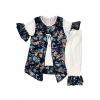What is the definition of naughty kids?
Eid Shopping For Kids - Eid Dress Designs
March 19, 2022
Carrycots are worth buying or not?
May 15, 2022
The Pros and cons of Online Shopping in Pakistan
May 29, 2022
Important stuff and baby things to buy before birth
March 20, 2022
Online Shopping For Kids? Kids Shopping
March 25, 2022
The Pros and cons of Online Shopping in Pakistan
May 29, 2022
What are the Baby bags necessities and buying guide?
May 29, 2022
Carrycots are worth buying or not?
May 15, 2022
Monthly Archive
My Wish List








